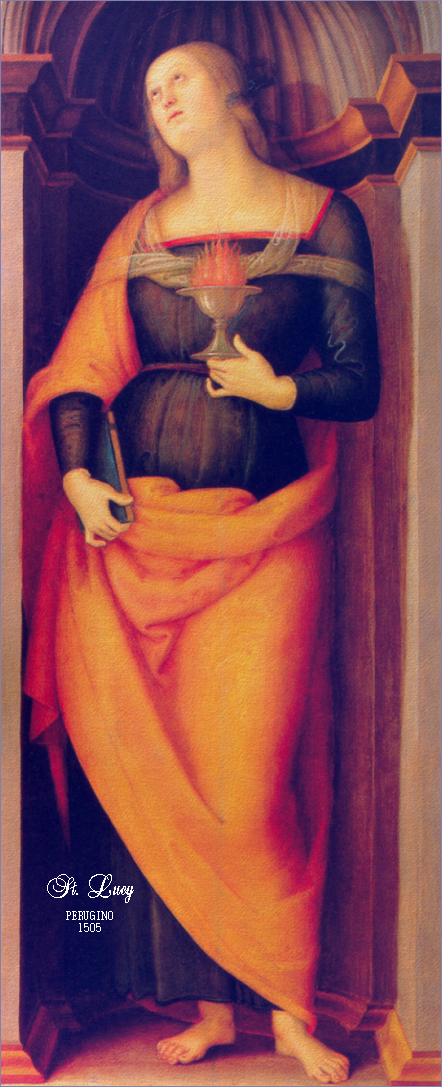-----------
 6. The Greatest Gift-----------of the Holy Spirit THE greatest gift which the Holy Spirit imparts to the soul is Sanctifying Grace, a gift so sublime, so precious and Divine that it "surpasses comprehension. It gives to the soul a resemblance to God, corresponding to His infinite sanctity, and imprints upon it the supernatural likeness of God. Through grace, the soul is clothed in such heavenly beauty that, in comparison, all earthly beauty seems vile. The value of Sanctifying Grace cannot be expressed. St. Thomas Aquinas says, "The least grace outweighs all the riches of this world." This is astonishing. We cannot comprehend it. Yet it is so and it can be thus explained: Whosoever has the lowest degree of Sanctifying Grace is a friend of God. If he dies in this Grace he will be happy forever in Heaven. God will give him a palace of inestimable worth, will make him a prince of the heavenly kingdom and will give Himself to him as his eternal reward. Now, since all the treasures of Heaven and earth are comprised in God, and God is of infinitely greater value than anything created, it follows that if man receives God Himself as a reward for Sanctifying Grace, he must have gained infinitely more than all the treasures of the world. Sanctifying Grace Increased We can increase our degree of Sanctifying Grace by every good work performed in the state of grace; and the more good works we perform, the more graces we merit. Not only by great deeds do we increase in Sanctifying Grace, but by every little act ----------- for example, by a fervent sigh, a devout glance at the Sacred Host or at a holy picture, by a humble inclining of the head at the Holy Name of Jesus, by pious aspirations such as, "O my God!" "O good Jesus!" "O purest Virgin Mary!" Each and every one of these good thoughts and holy desires, words and deeds increases the grace of God in us, and for each of them we receive a new growth in Sanctifying Grace and merit greater honor and joy in Heaven; and God gives Himself to us in a more abundant measure, so that we may know Him better, love Him more fervently and possess Him more perfectly. Moreover, even all our daily acts ----------- which are not of themselves acts of piety, such as eating, speaking, walking, working, etc. ----------- may be sanctified by doing them for the love of God, and thus they will also increase Sanctifying Grace in us and become meritorious for Heaven. Inexpressible Beauty Sanctifying Grace imparts to the soul an inexpressible beauty. It makes the soul so pleasing, so beautiful, so charming, that the beauty of the firmament and of the earth cannot be compared to it. If we could behold a soul in the grace of God, we would confess that all natural beauty vanishes before it. How inconceivable a beauty must our soul possess, since the infinitely beautiful God Himself takes unspeakable delight in it! The least degree of Sanctifying Grace imparts this beauty to the soul; but he who has more grace has a more beautiful soul, and the more grace he acquires, the more beautiful does his soul become. O my God, what a great wrong those persons commit who by mortal sin destroy the beauty of their soul and rob the Creator of His joy therein! A Child of God The soul is elevated so high by Sanctifying Grace that it becomes a true child of God. In utter astonishment at so great a love of God for His creatures, St. John exclaims: "Behold what manner of charity the Father hath bestowed upon us, that we should be called, and should be the sons of God." (1 John 3:1). As the rank of princes vanishes before God, so does every earthly rank fade before the privilege of adoption of children by the Almighty. The consideration of this truth induced a daughter of King Louis XV of France to become an austere Carmelite. While still living at court, this princess once reprimanded her maid of honor severely. The latter, a truly devout and Christian maid, meekly gave her mistress to understand that her reproaches were unjust. Exasperated, the princess demanded, "Do you not know that I am the daughter of a king?" "And I," responded the maid, "I am even a child of God." These words so deeply impressed the princess that in her ardent desire to become a privileged child of God, she renounced the world. Would that all who receive the inestimable grace of adoption of children of the Most High appreciated their exalted dignity! Treasure This Precious Gift As mentioned before, St. Thomas Aquinas teaches that the whole world with all that is in it has less value before God than one single soul in the state of Sanctifying Grace. And all this is due to the Holy Spirit, though not, however, independently of the other two Divine Persons. The Holy Spirit is the Spirit of Love, proceeding from the Father and the Son. The dispensing of Sanctifying Grace is the great work of God's love. How grateful, then, should we be for this work of sanctification, for this precious gift of grace, and how jealously should we guard this treasure! Hell tries its utmost to rob us of this jewel, for the fallen Angels realize its value. But alas, how many souls fail to prize its inestimable worth! Often they sell it for a trifle! After the battle of Burgundy in 1476, a soldier found a diamond among the spoils on the battlefield. He picked it up, but thinking it glass, threw it away. He picked it up again and sold it for a florin (about forty cents). O dear reader, the gem of Sanctifying Grace which God has placed in your heart is worth a million times more than the diamond which the soldier first cast away and then sold for a trifle. Do not for any price sell your precious gem of grace by mortal sin, for this jewel makes you richer than all the wealth of the world can. Pray, oh, pray, because Satan goes about seeking to rob you of your treasure! Inscription on a Tombstone There are people who, though physically alive, are spiritually dead because they are devoid of Sanctifying Grace. In a certain cemetery there was a tombstone bearing this curious inscription: Here rests N N. He died at the age of 90, but had lived only 3 years. A traveler, unable to comprehend its meaning, questioned the caretaker, who replied: "That man lived a life of sin till his 87th year. Only the last three years of his life were spent in the fear of God. Before his death he requested this inscription to be placed above his grave." The Temple of the Holy Spirit Origen, one of the great writers of the early Church, was the son of St. Leonidas, who suffered martyrdom for the Faith in 204, during the persecution under the Emperor Severus. When Origen was a child, St. Leonidas would approach his cradle and reverently kiss the breast of the sleeping boy. When asked why he did so, Leonidas replied: "The body of my child is a temple of the Holy Spirit." The Holy Spirit dwells in the soul of the just man and sanctifies, ennobles and enriches it by infusing into it Sanctifying Grace. This grace gives the creature a participation in the Divine nature, and the supernatural Divine life which this grace implants is crowned by the Holy Spirit's making likewise of the body His dwelling-place. Not content with giving us His graces and gifts, the Holy Spirit gives us Himself! He, Himself, as the seal of our sanctification, dwells in us, and He Himself, as the most excellent gift, accompanies His gifts of grace. All these countless magnificent gifts are bestowed for the sole purpose of endowing us worthily for the presence of so great a Majesty. The sanctity of our temple is the Holy Spirit Himself. This truth He wishes to impress upon all Christians with these words of the Apostle: "Know you not, that you are the temple of God, and that the Spirit of God dwelleth in you? ... For the temple of God is holy, which you are." (1 Cor. 3:16-17). The Temple Sanctified The Holy Spirit consecrates our heart for His living temple and dwells within us constantly in a new and wonderful manner. "If anyone love Me, he will keep My word, and My Father will love him, and We will come to him and will make Our abode with him." (John 14:23). What an inestimable treasure is Sanctifying Grace, which brings to us all gifts, even the Author of all holiness and goodness Himself. Yet how little this treasure is prized, how carelessly this jewel is squandered by committing mortal sin! Beloved soul, esteem this priceless gift! Oh, "if thou didst know the Gift of God!" (John 4:10). Did you but realize who He is who comes to you in Sanctifying Grace, how carefully you would preserve it, even at the sacrifice of your life! How thankful you would be to your parents, to the priests, to those who educate your mind, train your will and guide your soul, who help you to preserve the most precious treasure of Sanctifying Grace and the Holy Spirit! The Temple Defiled The Holy Spirit abides in our soul as long as we preserve ourselves from mortal sin. Mortal sin forces the Holy Spirit to depart. Light and darkness cannot dwell together. "What fellowship hath light with darkness?" asks St. Paul. (2 Cor. 6:14). The Holy Spirit has no communication nor indwelling with the evil spirit; they cannot abide together in a soul, and it is certain that a soul while in mortal sin is given over to the power of the evil one. The wisdom of the Holy Spirit does not enter a wicked soul; the Holy Spirit hates hypocrisy and does not dwell in a body that serves sin and vice. Oh, that we would ever remember the dignity to which our body has been raised by the indwelling of the Holy Spirit! What a sacred duty rests upon us to preserve this body undefiled and never to abuse it! All its members ----------- the eyes, the ears, the tongue, the hands, the feet ----------- must be servants of the Holy Spirit. Woe to those who desecrate this temple! The Apostle writes: "If any man violate the temple of God, him shall God destroy. For the temple of God is holy, which you are." (1 Col. 3:17). This temple is desecrated most frequently and most shamefully by sins of impurity. By day and by night, the evil one seeks to ignite this hallowed temple with sparks of impure temptations and to expel the Spirit of Divine Love therefrom. If we arm ourselves with the fear of the Lord, the demon cannot enter our heart or establish his dominion there. Let us avoid sinful thoughts, imaginations and desires; refrain from using impure language; and avoid works of darkness. Let us not sadden the Holy Spirit nor extinguish the holy fire of Divine love which burns on the altar of our heart. Let us be docile to the promptings of the Holy Spirit, Who with His Divine love will illuminate our mind, purify our body and soul and enkindle our heart. Would that we might realize what a dreadful misfortune it is to commit a mortal sin, which desecrates the temple of the Holy Spirit and drives Him from our heart with His glorious gifts and graces. When the Holy Spirit departs, we also lose Divine love, peace, joy, heavenly consolation and the hope of eternal salvation. Oh, how sad for the sinner to drive the Holy Spirit from His consecrated temple!  Should ever the great misfortune of losing Sanctifying Grace befall us, we should weep bitterly over this unspeakable loss and not rest day or night until we have regained the heavenly treasure. This most beautiful ornament of the soul, received in Baptism, if lost by mortal sin, is restored by the Holy Spirit in the Sacrament of Penance (Confession); also by Perfect Contrition when accompanied by the earnest will to go to Confession. [NOTE] Therefore, Sanctifying Grace is also called the "grace of justification," because it makes us holy and raises us from the state of sin to the state of justice, to that justice which makes us pleasing to God and capable of possessing Him forever in Heaven. St. Lucy's Answer St. Lucy suffered martyrdom under the Emperor Diocletian. She belonged to a noble family and possessed great wealth. A young pagan who desired to marry her denounced her to the prefect as a "Christian" because she refused to give him her hand. The prefect had Lucy apprehended and endeavored to gain her by threats and promises, but all in vain. Flattery proving fruitless, he ordered her to be scourged. On hearing this sentence, Lucy said: "You will only waste your time in torturing me, for the words I have uttered are not mine, but are inspired by the Holy Spirit." "Is the Holy Spirit dwelling in you?" asked the prefect. Lucy answered: "The hearts of the chaste and holy are the temples of the Holy Spirit." "Then I will take from you that virtue of which you speak," raged the prefect, "and the Holy Spirit will forsake you." In great fury, he ordered Lucy to be led to a den of wickedness, but when the wretched inmates tried to seize her, she stood immovable as a pillar. The tyrant then ordered her to be covered with oil and resin and to be burned to death. But the flames would not touch her, and the prefect, to accomplish her death, ordered her to be pierced by a sword. This was done, and the virgin Martyr went to rejoice forever in the love of the Holy Spirit. [Note: The Glories of Divine Grace, by the famous Fr. Matthias Scheeben, is perhaps the best exposition of Sanctifying Grace ever written. ----------- Publisher, 2002. Perfect Contrition is contrition because one has offended God, Who is all-good and deserving of all our love. Imperfect Contrition (which is sufficient for forgiveness in the Sacrament of Penance) is contrition from a lesser supernatural motive, such as fear of God's punishments or the hatefulness of sin. ----------- Publisher, 2002. DOWNLOAD THE IMAGE OF THE TRINITY  E-MAIL E-MAIL HOME----------------TRADITION-------------------VENI CREATOR www.catholictradition.org/Tradition/holy-ghost6.htm |